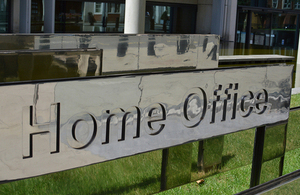Blanket ban to clamp down on 'legal highs'
Action to protect young people from the dangers of so-called ‘legal highs’ and target those who profit from their trade was announced by the UK government today (Friday 29 May).

The Psychoactive Substances Bill will prohibit and disrupt the production, distribution, sale and supply of new psychoactive substances (NPS) in the UK. They are often sold online or on the high street.
The ban will extend to the sale of nitrous oxide for human use, known as ‘laughing gas’ or ‘hippy crack’, although its legitimate sale will not be affected.
Minister of State for Policing, Crime, Criminal Justice and Victims, Mike Penning, said:
Young people who take these substances are taking exceptional risks with their health and those who profit from their sale have a complete disregard for the potential consequences. That’s why we are targeting the suppliers.
The landmark bill will fundamentally change the way we tackle new psychoactive substances - and put an end to the game of cat and mouse in which new drugs appear on the market more quickly than government can identify and ban them.
The blanket ban will give police and other law enforcement agencies greater powers to tackle the reckless trade in psychoactive substances, instead of having to take a substance-by-substance approach.
The government has already taken a range of action against so-called ‘legal highs’, including banning more than 500 new drugs and creating the Forensic Early Warning System to detect substances not seen before in the UK. There is also ongoing work to enhance the response to prevention, treatment and information sharing.
Last year the government established an expert panel on New Psychoactive Substances to look at ways of further enhancing the enforcement response. Having carefully considered the evidence, ministers decided to act on the panel’s recommendation to explore the feasibility of a blanket ban and are now introducing this new legislation.
Under the Bill:
-
it will be an offence to produce, supply, offer to supply, possess with intent to supply, import or export psychoactive substances; that is, any substance intended for human consumption that is capable of producing a psychoactive effect. The maximum sentence will be seven years’ imprisonment.
- all of the UK will be affected by the blanket ban and law enforcement powers would be extended to all NPS supply from UK websites, so they can be shut down.
- substances, such as alcohol, tobacco, caffeine, food and medical products, will be excluded from the scope of the offence, as will controlled drugs, which will continue to be regulated by the Misuse of Drugs Act 1971.
- there will be powers to seize and destroy NPS and powers to search persons, premises and vehicles, as well as to enter and search premises by warrant if necessary.
- similar to the legislation introduced in Ireland, it will also capture substances that, although not new, are psychoactive, have been used as intoxicants for many years and are not harm free.
- there will be provision for civil sanctions – prohibition notices and prohibition orders – to enable the police and local authorities to adopt a proportionate response to the supply of NPS in appropriate cases.
In 2013, there were 120 deaths involving NPS in England, Scotland and Wales.
National Police Chiefs’ Council Lead for New Psychoactive Substances, Commander Simon Bray said:
When people buy dangerous drugs they will generally have little idea how potent the drug is or what it may contain. Sadly we have seen too many people losing their lives or becoming seriously ill after taking so-called “legal highs” under the impression that they are safe.
A blanket ban on new psychoactive substances (NPS) will make it simpler for law enforcement to deal with those drugs which are potentially unsafe but which may not yet be controlled.
Founder of the Angelus Foundation, Maryon Stewart, said:
Angelus very much welcomes these important legal changes on restricting the supply of so called ‘legal highs’ or new psychoactive substances.
We expect the law to impact very significantly on the high street trade. The open sale of NPS has led to dangerous experimentation with many young people being badly affected by their unpredictable effects and some ending up in hospital.
Sadly, too many have paid the ultimate price from taking these risky substances and this change will go a long way to stop further deaths.
No law can offer the perfect solution to protect people from drugs; it is equally vital we all concentrate our efforts of making the public, young people in particular, more aware of the harms of these substances in schools, at university and during festivals.